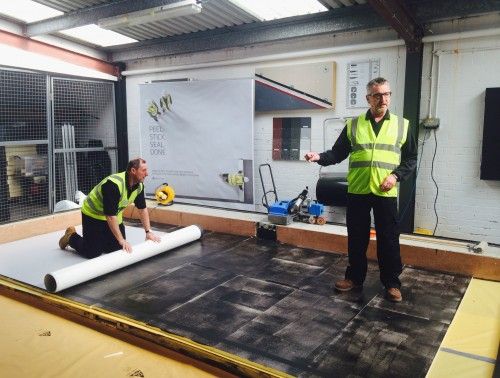
Recent news about the ever-increasing labour shortage in the construction industry has once again highlighted the sector’s dire need for new blood. A report conducted by the Construction Industry Training Board (CITB) forecast that 224,000 builders will be needed over the next five years to meet demand, with targets for the construction of one million new homes being a major factor. Simon Rubinsohn, chief economist of the Royal Institution of Chartered Surveyors (RICS), quoted in the Telegraph, believes that the shortage of workers is reaching “crisis point”.
With 400,000 construction workers expected to retire over the next ten years, it is vital that the Government gets its training policies right. Any reform to apprenticeship funding must not negatively impact on small construction firms who train the most new workers.
But how do we, as suppliers, aid the process of getting more personnel on site? The responsibility for the talent deficit falls not only with the Government, contractors and construction training organisations, but with those who have the expertise in the industry to offer training.
Proving skills and knowledge
An integral part of the industry’s training demands lies with the CITB’s Construction Skills Certification Scheme (CSCS card scheme). Construction workers across the UK are required to hold a CSCS card to prove their skills and their knowledge of health and safety, with different card colours issued depending on the role and training of the worker. In fact, nine of the UK’s ten biggest construction companies demand workers have them, as do many large organisations.
More than two million CSCS cards are currently in use across the UK. As a basic necessity in the scheme’s infancy, all labourers on construction sites were required to hold the initial green ‘Construction Site Operative’ (CSO) card, obtained through passing the CITB’s multiple choice health and safety test.
However, after 15 years of the scheme requiring those on site to hold a basic skills card, we are now faced with the issue that thousands of green card holders may have the wrong card. These workers are carrying out all manner of tasks on site, with no way of checking if they have right skills or knowledge.
The skills gap here is obvious – it is estimated that there are 600,000 people holding the minimum requirement of training that need to take the next step to get qualified further and raise standards in the industry.
To tackle this, in July 2014 the green CSO cards were discontinued and replaced with a new green ‘Labourer’ card. Applicants now need to pass a competency test in addition to the CITB’s online health and safety test.
Basic Competency Programme
Alongside this, a further change has been introduced to strengthen the scheme. A new training course called the Basic Competency Programme (BCP) has been set up to help to bridge the gap between the basic labourer card and the next step – achieving an NVQ required for a blue ‘Skilled Worker’ card. The BCP accreditation allows trainees to apply for a red ‘Experience Worker’ CSCS card, a stepping stone that is valid for three years and gives the card holder the time to study for their NVQ, while getting recognition for certain skills on site.
Here at Sika we have always been dedicated to providing contractors with the most up-to-date application training to ensure quality workmanship. To supplement this, in October we launched our BCP in partnership with the Liquid Roofing and Waterproofing Association (LRWA) and the Single Ply Roofing Association (SPRA). This is the first time that manufacturers’ training has been officially recognised and seen to satisfy the requirements of a red ‘Experience Worker’ CSCS card.
Theory, demos, videos & practical
Thanks to the comprehensive nature of the training at Sika, our single ply course already covers all of the areas required to achieve a BCP certificate, and our liquid membrane course only requires a one day supplement. This is testament to the quality of our offering, delivered at our purpose built Training Academy in Preston and at Sika’s headquarters in Welwyn Garden City. Our training courses are designed to ensure that contractors understand the requirements of working on our roofing systems, combining a mixture of theory, demonstrations, videos and practical application work. This benefits not only those who get accredited by us, but also the clients and end users of construction projects, especially when it comes to health and safety.
The BCP ensures that those currently with the wrong card can get the training they need, enabling them to get back on site as quickly and simply as possible. Plus, the course will contribute towards achieving the NVQ standard – we used to be an NVQ training centre and we know the standard and level of teaching required.
The team across our three roofing brands, Sika Sarnafil, Sika Liquid Plastics and Sika Trocal, all believe that CSCS cards are extremely important. The accreditation keeps construction workers up-to-date with the latest application techniques and keeps those on site and the general public safe. Plus, obtaining the correct card gives the green light for a person to work on site, helping to plug the labour gap.
The CSCS scheme requires industry-wide backing to deliver the extra training required to upskill the workforce and uphold its reputation. Manufacturers are essential to this process, and as experienced training providers, it seems only right that we invest in and support those in the roofing industry to reach their potential. As testament to this, the Applications Team across our three roofing brands is now 23-strong.
By offering high quality, accessible training, we not only strengthen the skills of those on site, but we also strengthen the reputation of the CSCS scheme. We believe that by nurturing trust in the scheme through legitimate training and testing we will encourage more young people to consider a career in the construction industry.



